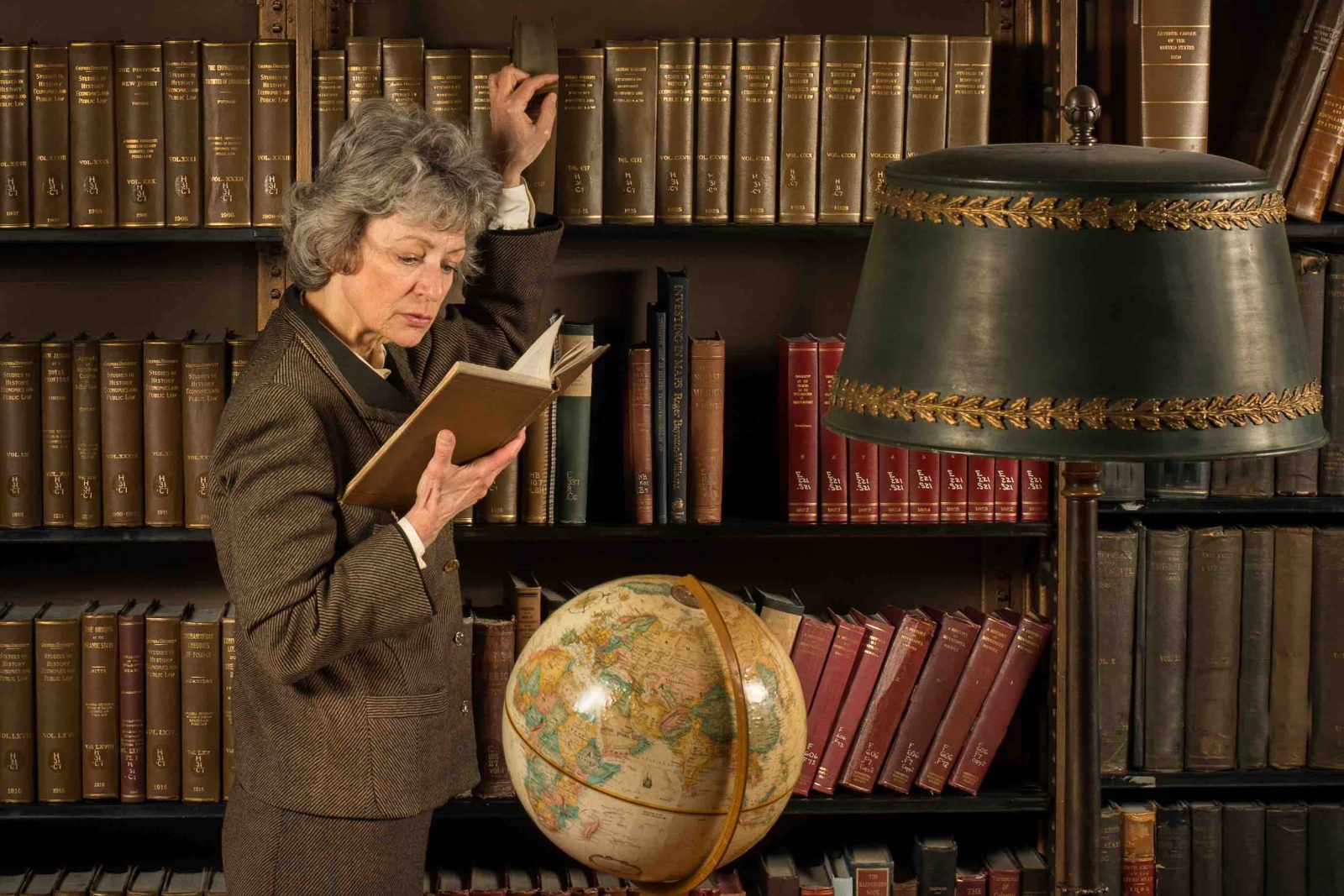
PHOTO BY ALLEN WEEKS
My first time seeing actor Sally Wingert, her energy carried the show. She was Madame Arcati—the spry, exuberant, and eccentric medium in the Guthrie’s Blithe Spirit this past October. A month after, I saw her in the Guthrie’s Indecent as one of the supporting cast members who dared to show God of Vengeance to the world in the 1900s. Then came her spring performance in the Guthrie’s Guess Who’s Coming to Dinner? Wingert goes from show to show without stopping, and not only is she a mainstay at our blue-hued theater, she’s a mainstay for the entire Twin Cities. Consequently, when we talked on the phone about her upcoming show Underneath the Lintel at Theater Latté Da (May 30-July 1), I tried to stick to the play instead of demanding her life story and asking star-struck questions.
Underneath the Lintel is about a librarian who receives a book 113 years overdue and goes on a grand adventure across the world to figure out who checked it out. (What else would one do in that situation?) Perhaps I held back too much when I talked with her, and maybe I don’t have the complete picture of her thoughts. But even with the short conversation we had, it’s apparent how much she loves the play, her work, Theater Latté Da, and the Twin Cities.
When I waffled on whether to call her a local actor—she has had stints in places like Broadway and London—she gently but firmly cut in to say, “I’m a local actor. I occasionally work out of town, but this is my home.”
If you miss Underneath the Lintel, you will undoubtedly be able to see Wingert in other plays, solo or otherwise. However, the understated beauty that seems to exude from her descriptions of it, the particulars and the syntax that she extolled, are similar to a gardener talking about one rose he tends to among many. Each is special for different reasons, and Underneath the Lintel seems to promise something that is nostalgic, whimsical, and tenacious. Here’s a snippet of what we talked about:
Had you read or seen Underneath the Lintel before?
I have never seen it before, and I had not read it prior to beginning to work on it. We did a workshop last summer with Glen Berger [the playwright] and Frank London [whom Latté Da commissioned to write new music for the play], and that was the first time I had first hand knowledge of it. I had sure heard about it. Both of the men that had performed it in new work, but T. Ryder Smith and David Chandler are actors that I’ve worked with, and I remember them talking about how important it was to them and how they loved that show.
Almost all of the play’s performances feature a man as the librarian. How did you come to be the librarian, and did you have any thoughts on that?
A few years ago, a couple years ago, Glen adapted it. … He had heard about a production where a woman had done it, and I don’t remember this story although he did talk about it, and he thought, yeah, that works, with very little changes. Some of the gender pronouns are changed and all of that, but not much has changed, and to be honest with you, I cannot imagine it as a man now. I can’t at all. It’s interesting.
I think we can blast gender off the map kind of in a way now. I do. Maybe we always kind have, but in this day and age, we can. But to speak to Peter (Rothstein, Latté Da artistic director) casting me, I think he was looking for a project for us to do. I mean we have a lot of things to talk about, and he’s a dear friend of mine as well, and I think he enjoys working with me as well, so we’re always kind of looking projects to do, things to do. He was interested in Underneath the Lintel because Glen the playwright talks about his inspiration for the entire piece was in klezmer music.
Any other thoughts on gender roles and theater?
We’re just behind. The notion of fluidity, inclusivity. I just think women are perhaps just demanding to be heard more, and perhaps the climate is more conducive to hearing what we have to say. But it’s not just a two-gender deal, I think of the whole spectrum, and i think all of that can sort of … There’s just a lot of places where fluidity is interesting. I think it adds to the conversation; I think it can deepen the ideas, where we can go outside the box, giving everyone a chance. It’s a learning curve we have to accept.

Sally Wingert with musical director Dan Chouinard rehearsing “Underneath the Lintel.” Photo by Sally Wingert stars in the one-person play “Underneath the Lintel,” showing at Theater Latté Da, May 30-July 1, featuring new music by Frank London.
Photo by Emilee Elofson.
Do you relate to the character at all?
This is probably my limitations as an actor because much of her rhythm is like my rhythm, but she is very much not me. This is not like Sally, although people will sure see me in it because that’s what we do. We look for meaning, we look for similarity, and that’s really fun. She has something that she really wants to share, and that is completely, you know, that’s me. One of the reasons , the chief reason I love/hate, one of the reasons I love theater, is I absolutely love interaction with a larger community, a larger group of people, i.e. an audience. It’s thrilling to me that we all come together and leave having shared something.
Reading a bit about the play’s plot, the librarian seems stuck in the beginning. Do you agree?
I think that on some level, she has an awareness of being stuck, but I think this journey slightly sneaks up on her, one, and two, she’s not self-actualized in that way of, “I’m gong to have an adventure in my life.” She doesn’t put on her adventure pants and say, “Let’s go have fun, let’s go learn.” She’s a librarian, and she’s officious and she has all kinds of fact. When this overdue book happens, she’s appalled and then becomes slightly curious, and that leads to more curiosity, leads to more discoveries, and all of a sudden her toe is dipped in the larger world, into experience and life, and she finds herself going on, not only accepting the adventure, but being really stimulated about it.
It’s mine to mess up because it’s a beautiful play, and the design’s really cool, and the musicians (music director) Dan Chouinard and Natalie Nowtski are astonishing, so if it isn’t good, you can blame me and you should.
How is doing a one-woman show?
Not the least of which, it’s somewhat of an endurance contest, you know? There’s a lot of energy that is being sent out. And in the rehearsal hall, although I have an astonishing stage management team and I mean really, like, please say that—it’s an astonishing team, they’re so kind, and of course Peter, they’re really attentive and enrapt and listen well, but they can’t to begin to approximate the energy I hope to receive from the audience. By the end of the evening, I will no doubt be ready to sort of drop.
Last thoughts?
It would be lovely for me if you could mention the design team which is pretty fantastic and that Latté Da is a really fantastic theater to work at. The piece can make one feel pretty vulnerable—being the only speaking words on stage can be a lonely thing—but when you’re at Latté Da, you never feel lonely.
I have one more general house-keeping question: How long is the play?
About 90 minutes, no intermission. So pee before you sit down. [laughs] ‘Ever graceful, ever the lady,’ she says.






